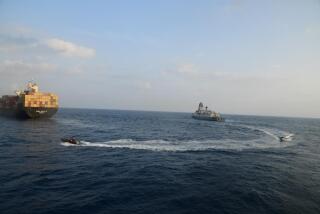U.S. Trying to Halt Iran Rocket Fuel : Over Objections by Customs Service, Judge Orders Key Chemicals Released
- Share via
WASHINGTON — The Customs Service is fighting what may be a losing battle to halt what it says is an attempt by Iran to obtain about 286,000 pounds of a now-scarce rocket fuel ingredient from an American company--fuel enough for about 300 military missiles.
The struggle, now the subject of a federal court case and internal squabbling within the Bush Administration, illustrates the difficulty U.S. officials still face in constructing a leak-proof barrier between the regime of the Ayatollah Ruhollah Khomeini and sensitive military supplies.
The potential shipment was considered particularly significant because it came at a time--in February, 1988--when the Iran-Iraq conflict was in the “war of the cities” phase in which the two sides were firing Soviet-supplied, short-range ballistic missiles at each other’s population centers.
Monday May Be Critical
The dispute over the chemical may reach its climax Monday in a federal court in Houston where the judge has already issued a temporary injunction requiring the government to release the 1,144 drums of ammonium perchlorate, an indispensable component of the solid fuel in rockets ranging up to the giant MX missile.
If that order stands, the chemical will be returned to the small Tampa, Fla., company that Customs officials believe was involved in the original attempt to ship it to Iran. And according to government sources, the case has become such a headache that the Administration has not yet decided if it will continue to fight--as the Customs Service wants to do--or give up, a course with strong support in the Justice Department.
The saga began Jan. 28, 1988, when Girindus Corp. of Tampa shipped the chemical from Houston to Europe with a bill of lading showing that it was bound for a buyer in Basel, Switzerland. About a month later, the cargo was seized as it was being loaded on an Iranian freighter in the Dutch port of Rotterdam.
The company maintains that it never intended to sell the chemical to Iran.
U.S. District Court Judge Sim Lake ruled last week that the Customs Service had no legal authority to seize the shipment because ammonium perchlorate, in its pure form, was not on the list of weapons-related items requiring a special license from the State Department.
U.S. officials concede that the chemical was not on the munitions list in February, 1988, although the Customs Service, at least, maintains that it has since been added. Curiously, the State Department issued a special export license covering the shipment of the chemical to Europe after it had already been seized by Customs.
Customs has urged the department to revoke the license. A State Department spokeswoman declined to comment on the matter because, she said, the case is still in litigation.
Covered by One Statute
Regardless of whether the chemical is covered by State Department-enforced munitions control law, a fuel-grade version of the chemical is clearly covered under the Missile Technology Control Regime, established in April, 1987 to keep ballistic missile components away from Iran, Iraq and other potential Third World combatants.
The company maintains that the pure form of the chemical is not the same as the compound covered by missile control restrictions. But an Air Force official said the chemical at issue in the case could be used in rocket fuel “pretty much as is.” And Peter D. Zimmerman, an arms technology expert at the Carnegie Endowment for International Peace, said the pure chemical could be converted into a fuel component by Iran or any other nation with a chemical industry of similar sophistication.
There is no indication in the court documents that the missile control restrictions were ever invoked.
The United States exports between 1 million and 2 million pounds of ammonium perchlorate a year, mostly to the weapons and rocket programs of friendly countries.
Supply Critically Short
The compound, used as an oxidizer in rocket fuel, has been in critically short supply since last May when an explosion destroyed the Henderson, Nev., plant of Pacific Engineering and Production Co., the primary manufacturer of the product.
Zimmerman said the shortage “is the bottleneck in U.S. ability to produce MX missiles, Trident missiles and the strap-on rockets for the space shuttle.”
A U.S. Air Force official said Iran might have needed some of the chemical to refuel Soviet rockets although this is seldom required. More significantly, he said, Iran is developing its own arsenal of short-range surface-to-surface missiles, a project which unquestionably requires ammonium perchlorate.
In any case, Pentagon officials say, the chemical is the sort of thing the U.S. government wants to keep out of the hands of the Tehran regime. Nevertheless, the U.S. government may be powerless to prevent the transaction.
Either or, Judge Says
Judge Lake ordered the Customs Service to return the chemical--now held in a U.S. warehouse in Arkansas--to the Girindus firm by Monday or to move ahead with a formal action to require the company to forfeit the property.
A Customs Service source says the Justice Department still has not decided whether to continue trying to block the shipment in the face of Lake’s preliminary ruling that the transaction was not illegal.
At the same time, Customs is urging the State Department to revoke the export license it granted Girindus. A company attorney said the firm applied for the license “just to be super safe” after it received a letter from the State Department saying that a reinterpretation of the statute indicated that a license may be necessary.
However, the firm maintains that it did not need a permit at the time of the original shipment, a position which the judge upheld.
Lake ruled that the Customs Service did not prove that the chemical was headed for Iran. But he said that, even if it was, the transaction would not have been illegal.
“Assuming that there was evidence to transship this material to Iran--and I haven’t heard any evidence of that today-- . . . the fact that the government issued subsequent export licenses . . . shows that . . . the agency given primary responsibility for the munitions export regulations, the Department of State, does not view this as a situation involving significant harm to the government.”
Lake also ruled that the chemical is deteriorating during its year of enforced storage.
“It appears to me that the reason for the delay here is the failure of the State Department to coordinate with the Customs (Service) and for Customs to coordinate among its various branches,” Lake said.
Times staff writers John M. Broder, in Washington, and J. Michael Kennedy, in Houston, contributed to this story.
More to Read
Sign up for Essential California
The most important California stories and recommendations in your inbox every morning.
You may occasionally receive promotional content from the Los Angeles Times.













